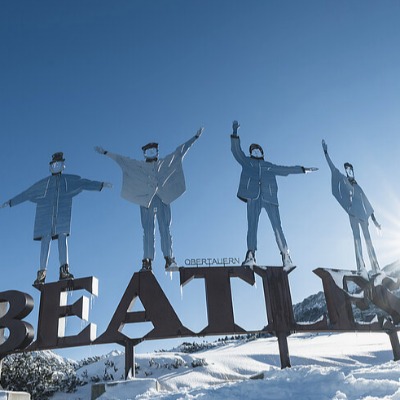German Bundestag: Experts Rate Snowmaking On Ski Slopes Differently

At a hearing in the German Bundestag Tourism Committee on the topic of tourism and winter sports in times of climate change on Wednesday, April 19, 2023, the seven invited experts disagreed, some of them clearly, about how badly snow-making on ski slopes with artificially produced snow damages the environment. The experts also named the inadequate connection to local public transport and the lack of diversification of the tourist offer as further problems for the sustainable future of the winter sports areas.
Careful use of water and energy
Max Hillmeier, Tourism Director of Bad Hindelang Tourismus, pointed out that skiing itself only produces around six kilograms of CO2 per person per day on average. That is about as much as a car ride of 30 to 40 kilometers. The real problem remains the arrival and departure of the guests, which is mostly done by private car.
Of course, work must be done to ensure that water and energy resources are used sparingly when making snow, in which water from storage tanks is applied to the slopes with a snow cannon or snow-making machine as snow.
Expert: Snowmaking is “essential worldwide” for winter sports
Julian Pape, project manager of the Sauerland/Siegerland-Wittgenstein winter sports arena, described snowmaking as “essential worldwide” for winter sports. This not only has to do with the fact that no natural snow is available, but also with the quality of the snow, which is important for the groomability of the slopes, for popular sports or for competitions.
The fact that 30 million people in Germany can reach it within three hours speaks for his winter sports region: "This is unique in Germany," says Pape.
More support for public transport connections required
Klaus Schanda, Head of Sales, Marketing and Communication at Zugspitzbahn Bergbahn AG, also addressed the issue of accessibility. "We need more support in connecting to local public transport," said Schanda at the hearing.
In his Garmisch-Partenkirchen region, people have been working intensively on an improved connection for ten years. All valley stations in the skiing and hiking areas can be reached with regional public transport, and most of them can even be reached with a historic rack railway.
Expert: Look at a region's overall efforts
Wolfgang Langer, Mayor of Braunlage, reported that his region was still lagging behind in terms of infrastructure compared to larger winter sports areas.
However, he advocated looking at the overall efforts of a region and not just at snow production when considering the environmental impact of skiing. "It's important to look at what the places are already doing locally, instead of evaluating it in isolation," said Langer.
consequences of snowmaking
Prof. Dr. Carmen de Jong from the University of Strasbourg is clearly against downplaying the consequences of snowmaking.
The artificially produced snow from reservoirs changes the nature of the water, which has been scientifically proven, as has the fact that the artificial storage of water over months increases the scarcity of water as a resource. "You can't argue that just because something is economically important doesn't mean it's environmentally harmful," de Jong said to the other experts.
Winter sports as an "important experience of nature" for children
Herbert John, President of the Bavarian Ski Association, pleaded for the support of winter sports, also from the point of view of promoting young people for popular and top-class sports. "It's important to get the kids out in the snow," John said. If you no longer have good training opportunities, you will no longer play a role at the top of winter sports within two Olympic cycles, i.e. in eight years.
Winter sports are also an important experience of nature for children and part of nationality.
"Think of the offspring"
Alexander Richter, owner of Snowsports - Holzhau ski area in the Ore Mountains, also emphasized the importance of winter sports for children and young people. Due to the restrictions of the corona pandemic, the children lost three years in their sporting development.
If the operation of the ski areas were to be further restricted, this would endanger skiing and, in particular, the promotion of young people. "The conditions are currently a disaster," said Richter and appealed to the MPs: "Think of the children, think of the offspring."













